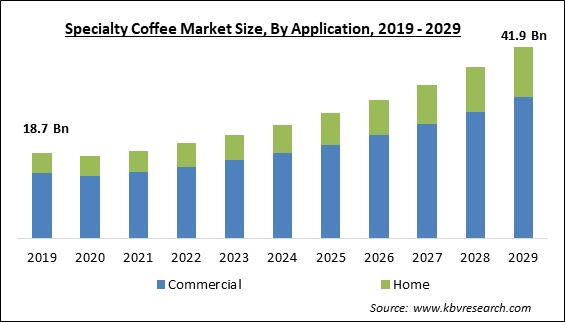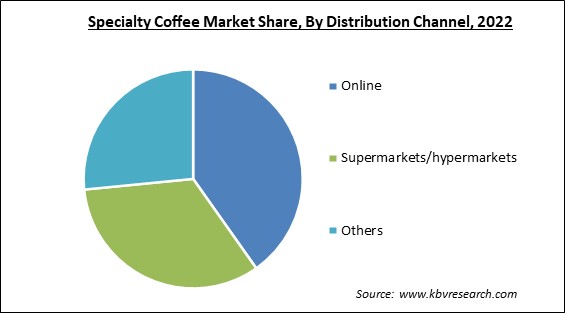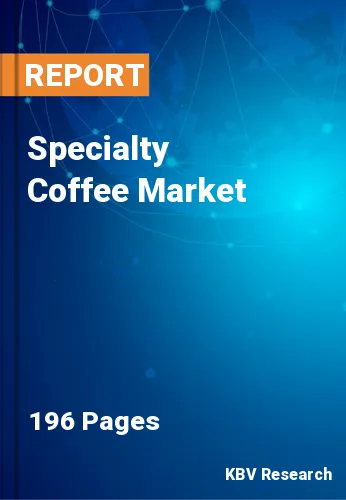The Global Specialty Coffee Market size is expected to reach $41.9 billion by 2029, rising at a market growth of 10.8% CAGR during the forecast period.
Handcrafted, high-quality coffees that have been carefully cultivated and processed are referred to as specialty coffee. Coffee beans that are labeled specialty grade must adhere to a set of criteria and are typically sourced from particular areas or nations. These requirements cover the bean's color, dimensions, shape, flavor profile, aroma, and degree of acidity. In order to bring out the greatest flavors of each individual bean, specialty coffee is often roasted in small quantities by skilled roasters who pay close attention to every detail of each roast.

The third wave of coffee is called specialty coffee, which is connected to the brewer and the farmers. Specialty coffee, which can be defined as coffee brewed using the current brewing methods and using high-quality coffee beans, has benefited from the trend of adopting artisanal products. Additionally, the term "specialty coffee" describes coffee that has received a score of 80 or higher on a scale of 100 by a qualified coffee taster or a licensed Q Grader (CQI). A series of more specific requirements are provided by the specialty coffee association. The specialty coffee organization also establishes precise guidelines for the grading of coffee. The specialty coffee organization also establishes standards for specialty coffee at every step of the coffee production process, including allowable flaws in water, green beans, and brew strength requirements.
The right cultivation and harvesting techniques, which reduce flaws and guarantee peak ripeness, are used to find high-quality coffee beans. Additionally, graders establish quality requirements for the coffee beans to ensure they meet specialized standards. Finally, to bring out the right bean scents, qualities, and flavors, roasters must use the proper roasting procedures. When coffee is brewed correctly, the flavor character of the coffee beans is highlighted rather than the coffee being acidic or unpleasant.
Despite the unprecedented difficulties faced by the coffee industry amidst the pandemic, there have been notable positive trends that have surfaced. The rise of remote work and the closure of cafes and restaurants resulted in a surge in the consumption of coffee at home, leading to an increase in sales of coffee beans, grounds, and capsules. Retail coffee sales witnessed a surge in growth, especially in the e-commerce sector, as consumers opted for online shopping due to its convenience and safety. Customers aimed to recreate the coffee shop ambiance in their homes, and opted for premium coffee products aiding the specialty coffee market to recover after the initial fall due to the pandemic.
Regulated coffee intake can aid in the prevention of chronic conditions such as type 2 diabetes. The presence of chlorogenic acids in coffee, a potent antioxidant, is linked to a lowered risk of diabetes. In addition, coffee has the potential to regulate hormones and gut peptides, which can aid in slowing down digestion and managing blood sugar levels. The numerous health benefits associated with coffee have significantly impacted its consumption. In addition, the increasing demand for premium-quality coffee, especially in the developed regions, has led to a rise in sales of specialty coffee. Thus, these factors are contributing to the expansion of the market.
Specialty cafes are experiencing a surge in demand for high-quality coffee and premium coffee beans sourced globally. Specialty coffee shops have become popular for business meetings and gatherings due to their selection of exotic coffee beans, a diverse range of coffee types, and sophisticated preparation methods like that of specialty coffee. In addition, remote work is becoming increasingly popular in the business world. As a result, cafes that offer complimentary internet, reasonable pricing, and uninterrupted seating have experienced significant growth in the past year. The growing popularity of coffee shops and cafes presented an opportunity for the specialty coffee market to expand, given their premium quality and added advantages.
The current market competition among vendors has led to decreased profit margins, despite the rising costs of raw materials. The need to maintain competitiveness in the market prompts manufacturers to explore low-cost alternatives like instant coffee powder and low-grade coffee beans. This factor plays a significant role in their decision-making process. Furthermore, raw material suppliers have the ability to offer their products at varying and competitive price ranges. As a result, the specialty coffee market growth is expected to be limited during the forecast period due to the fluctuating prices of coffee beans and increased market competition, forcing some manufacturers to sell products at a loss.
Based on age group, the specialty coffee market is segmented into 18-24, 25-39, 40-59 and Above 60. The 25-39 segment acquired a significant revenue share in the specialty coffee market in 2022. This is because the age group of 25-39 has experienced significant growth in popularity in recent years. As these consumers increasingly seek out new and unique coffee experiences, specialty coffee offers a wide range of flavors, brewing techniques, and origins to satisfy their curiosity.

On the basis of application, the specialty coffee market is divided into home and commercial. The home segment procured a substantial revenue share in the specialty coffee market in 2022. This is owing to the rise in demand for specialty coffee brewing equipment, including espresso machines, pour-over setups, and high-quality grinders, which has contributed to the growth of the segment. This is due to the increased availability and affordability of such equipment, enabling consumers to recreate the cafe experience in the comfort of their homes.
By distribution channel, the specialty coffee market is classified into supermarkets/hypermarkets, and online. The online segment witnessed the largest revenue share in the specialty coffee market in 2022. This is because the trend toward online channels among consumers is driven by the convenience they offer, including attractive discounts, access to a wide variety of products on a single platform, simple payment options, doorstep delivery, and more. Moreover, e-commerce vendors frequently offer an extensive range of distinct coffee blends and labels, which may not be accessible at conventional physical outlets.
| Report Attribute | Details |
|---|---|
| Market size value in 2022 | USD 20.8 Billion |
| Market size forecast in 2029 | USD 41.9 Billion |
| Base Year | 2022 |
| Historical Period | 2019 to 2021 |
| Forecast Period | 2023 to 2029 |
| Revenue Growth Rate | CAGR of 10.8% from 2023 to 2029 |
| Number of Pages | 196 |
| Number of Table | 350 |
| Report coverage | Market Trends, Revenue Estimation and Forecast, Segmentation Analysis, Regional and Country Breakdown, Companies Strategic Developments, Company Profiling |
| Segments covered | Age Group, Application, Distribution Channel, Region |
| Country scope | US, Canada, Mexico, Germany, UK, France, Russia, Spain, Italy, China, Japan, India, South Korea, Singapore, Malaysia, Brazil, Argentina, UAE, Saudi Arabia, South Africa, Nigeria |
| Growth Drivers |
|
| Restraints |
|
Region-wise, the specialty coffee market is analyzed across North America, Europe, Asia Pacific, and LAMEA. The Europe region registered the highest revenue share in the specialty coffee market in 2022. This is owing to the increasing demand for high-quality specialty coffee types that have played a significant role in the growth of the European market. The demand for premium coffee is on the rise in Western Europe, particularly at specialized coffee shops. As a result, there has been an increase in the number of specialty coffee shops in Western Europe in recent years.
Free Valuable Insights: Global Specialty Coffee Market size to reach USD 41.9 Billion by 2029
The market research report covers the analysis of key stake holders of the market. Key companies profiled in the report include Starbucks Corporation, Inspire Brands, Inc., F. Gavina and Sons, Inc., Barista Coffee, Coffee Day Enterprises Ltd., Blue Bottle Coffee, Inc. (Nestle S.A.), Eight O'Clock Coffee Company (Tata Consumer Products Limited), Keurig Dr Pepper, Inc., Costa Coffee (The Coca-Cola Company) and The J.M Smucker Company.
By Distribution Channel
By Application
By Age Group
By Geography
The Market size is projected to reach USD 41.9 billion by 2029.
Coffee consumption enhancing health are driving the Market in coming years, however, The fluctuating prices of coffee beans restraints the growth of the Market.
Starbucks Corporation, Inspire Brands, Inc., F. Gavina and Sons, Inc., Barista Coffee, Coffee Day Enterprises Ltd., Blue Bottle Coffee, Inc. (Nestle S.A.), Eight O'Clock Coffee Company (Tata Consumer Products Limited), Keurig Dr Pepper, Inc., Costa Coffee (The Coca-Cola Company) and The J.M Smucker Company.
The Commercial segment acquired maximum revenue share in the Global Specialty Coffee Market by Application in 2022 thereby, achieving a market value of $31 billion by 2029.
The Europe market dominated the Market by Region in 2022, and would continue to be a dominant market till 2029; thereby, achieving a market value of $13.8 billion by 2029.
Our team of dedicated experts can provide you with attractive expansion opportunities for your business.

